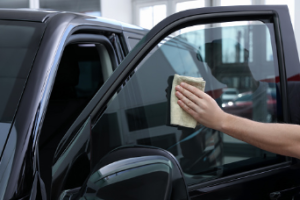Tinting your car windows can be a great decision for your car and the environment. Various films are available, including dyed, infrared and ceramic. Each of these films has a different set of benefits.
Dyed Film
You can install a dyed film to improve your vehicle’s appearance or protect it from damage—however, a few things to remember before purchasing a dyed window film.
First of all, there are a lot of different types of window film. Each has its advantages and disadvantages. Therefore, you should take the time to investigate each one before you make a purchase.
 For instance, the dyed film you buy isn’t likely to last long, so choosing a high-quality film you’re confident you’ll enjoy for years is important. You should also keep in mind the type of adhesive you use. The adhesive layer will make or break the reliability of your film.
For instance, the dyed film you buy isn’t likely to last long, so choosing a high-quality film you’re confident you’ll enjoy for years is important. You should also keep in mind the type of adhesive you use. The adhesive layer will make or break the reliability of your film.
The most effective dyed film on the market today is glare control. Glare control blocks bright reflections and reduces the heat inside your vehicle. Glare control is also guaranteed to deliver a good year-round performance.
The first layer of a dyed window film is an adhesive. This adhesive helps keep the film from scuffing when you clean the windows. The second layer is a dyed polyester film that blocks light. The final layer is a polyester top coat that protects the window from scratches.
The dyed film is usually rated by the VLT (visible light transmission) percentage. This measure of how well the film cuts light will vary depending on the brand you buy. A lower VLT percentage means less light is blocked. A higher VLT percentage means more light is blocked.
Another thing to look for is the colour of the dyed film. Most dyed films are dyed a specific colour. For instance, gold is a popular colour. You can also look for films that are made with UV protection. This type of tint blocks UV rays that can cause sunburn.
Finally, you should consider the cost of each type of film. For example, dye tint is generally less expensive than other types of films. On the other hand, the metallic window film will cost you more. However, the metal particles used in the film will improve the durability of the window. They also give it a shiny appearance from the outside.
Ceramic film
Whether you’re looking to block sunlight, reduce glare, improve your car’s security, or save money on your AC, ceramic film for car window tinting is an excellent choice. It’s durable, effective, and provides more bang for your buck.
Ceramic window film blocks up to 99% of harmful UV rays from the sun. It helps to protect your skin and prevent skin cancer. It also blocks heat caused by infrared light. It does this by reducing interior car temperatures by as much as 85%.
Nano-Ceramic car tinting Auckland is a newer, improved version of the classic ceramic tint. It’s much more durable than plastic and blocks up to 99% UV light. It also comes in several different shades. It’s also scratch-resistant, which helps to keep the window film in top shape.
Aside from providing great UV protection, a ceramic film for car window tinting is also a great way to add privacy to your vehicle. Unlike many other window films, the ceramic film doesn’t contain metal so it won’t interfere with electronic signals.
A ceramic film for car tinting Auckland is an investment that will pay off in the long run. It’s also an excellent way to protect passengers in an accident.
Ceramic window film for car window tinting has been proven to provide the most effective UV protection while at the same time improving the stability of side windows. It also offers the most advanced technology. You can also use it as a windshield IR-blocking tint.
Infrared film
Choosing the right infrared film for your car is an important decision. You’ll want to find a film that offers protection from UV and infrared rays and protection from the sun’s glare. You also need to consider the durability and warranty of the film. Again, there are a variety of films to choose from.
The 3M Automotive Window Film Ceramic IR Series is a great choice for high-performance infrared rejection. This film is made of nano-ceramic particles that add to the film’s strength and offer excellent infrared rejection. The film is available in various shades and backed by a lifetime warranty. It offers great performance and is an ideal factory match for your vehicle’s tinted windows.
Several films have been developed to block heat transfer. For example, ceramic window films are made of a special manufacturing process that combines dyed polyester film with nano-ceramic film. It provides a durable film that is virtually maintenance-free. It also reduces glare and the feeling of the sun on your skin.
In addition to heat rejection, ceramic films also provide ultraviolet protection. It will help your family stay safe from harmful UV rays. They also block 99 per cent of UV energy.
Ceramic IR films have been tested and found to provide a lifetime guarantee. They are also colour-stable. This film provides stable access to cell phones and navigation systems. It also helps to keep your car comfortable inside and out. You’ll also experience a reduction in fuel consumption.
Safety benefits
Car window tinting can also help protect your passengers from injuries caused by shattered glass. It is because the shards are less likely to spread if they hit the film instead of shattering it into pieces. It means you are less likely to suffer from cuts or bruises.
Tinted windows can also help you keep valuables hidden. If thieves break into your car, they will likely lose some of the valuables they are looking for. They will be unable to see your items or the items you have inside the car. It will make them think twice about entering your vehicle.
